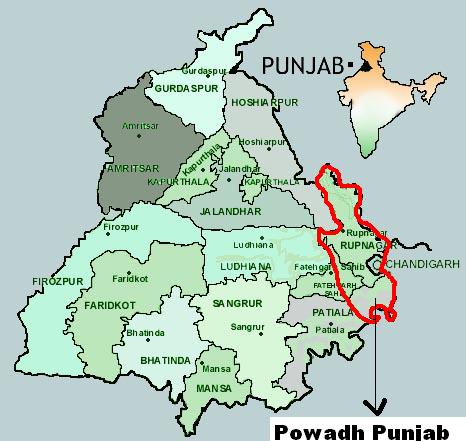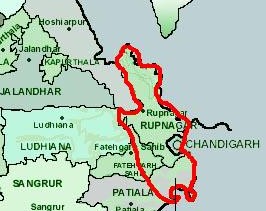Poadha
Powadh (or Puadh or Powadha) is a region of Punjab and parts of Haryana between the Satluj and Ghaggar rivers. The part lying south, south-east and east of Rupnagar adjacent to Ambala District (Haryana) is Powadhi. The Powadh extends from that part of the Rupnagar District which lies near Satluj up to the Ghaggar river in the east, which separates the states of Punjab and Haryana. Parts of Fatehgarh Sahib district, and parts of Patiala districts like Rajpura are also part of Powadh. The language is spoken over a large area in present Punjab as well as Haryana. In Punjab, Kharar, Kurali, Ropar, Nurpurbedi, Morinda, Pail, Rajpura and Samrala are the areas where the Puadhi language is spoken and the area itself is claimed as including from Pinjore, Kalka to Bangar area in Hisar district which includes even Nabha and Patiala in it.
Poadh is a vast region, consisting of all of and Panchkula district in Haryana and Chandigarh and a big area of south east Malwa, consisting of Patiala, Mohali, and Ropar districts. The majority of population is Sikh, and unlike most other areas in Punjab the majority is not Jat. It had its own poets even at Akbar's court such as Mai Banno of Banur and more recently Bhagat Asa Ram Baidwan of Sohana. The Dhadd Sarangi and Kavishri way of singing are said to have originated here only and also different types of Akharas such as that of famous Rabbi Bhaironpuri.
Compared to Majha (comprising of Amritsar and Gurdaspur and Tarn Taran districts) and Doaba(comprising of Jalandhar, Hoshiarpur, Kapurthala and Nawanshahr districts), Malwa (comprising Barnala, Bathinda, Faridkot, Firozpur, Ludhiana, Mansa, Moga, Muktsar, Patiala, and Sangrur), Powadh comprises of the districts of Rupnagar, Mohali, part of Patiala district around the Ghaggar river and parts of Fatehgarh Sahib district as well as Chandigarh.
The people of the region are known as Powadhis. The dialect of Punjabi spoken in powadh is called Powadhi.
Dialect of the area
The characteristics of the Powadhi dialect within the Rupnagar District are the pronunciation of vice as bice, 'in'; the insertion of an aspiration/tone in words like balad (pbd) 'ox'; the frequent dropping of the first syllable as in khu; con (y{ju'A) instead of khu : biccon (T[BK u'A) instead of 'unha ; n biccon (T[B{K ftZu') 'from among them' ; and frequent transposition of high tona as in unu : n (T[Bz{) for unu : n (UB{) A 'to him'; oda : (T[dk) for oda : (Udk) 'of him'; jera (i/VQk) for jera (i/jVk) 'who'.
In certain cases, even the initial h (j) sound is replaced by tone as in neri : (B/oh) 'storm' from haneri : (jB/oh). The oblique forms of pronouns like minnu : n (fwB{z) 'to me'; ma : nu : n (wkjB{z) 'to us' : tinnu : n (fsB/) 'to you: thuanu : n E[nkB{z) 'to you' (pl) ; onu : n (T[jB{z) 'to him' etc. are characteristic of this area. Since the Powadh area of Rupnagar District lies on the border of Bangru speaking area, some influence of Bangru on its vocabulary is quite natural. Thus we find hamen ( ) 'we ' thamen ( ) 'you' (pl) the : ra : ( ) 'Yours along with asi: n ( ) tera : ( ) respectively; ma as locative postposition; ka ke ki: ki: an as postpositions of genitive , ets. These forms are more common with elderly folk. The post position of accusative case is nu: n ( ) although ko ( )is also spoken in some parts in some parts of this district.
The consonant conjuncts are almost absent. The conjuncts which appear in words like pa: njs : ( ) 'sister's son' ; carda: ( ) 'East' , chipda: ( ) ' West', nambarda : 'headman', etc., are very loose clusters because in these fall in different syllables.
A select list of words and phrases in common use in the area include ba :i ( ) 'ploughing', barga : ( ) ' like ' jua:k ( ) ' child', ga:e ( ) ' cow', nia: ne ( ) 'children',vagda: ( ) ' following ( water) , a: va: tia: hoya :ya:,( ) cak nai: n hunda ( ) dubane te darda ( ) rakhde hunde the ( ) etc
| Regions of Punjab |


